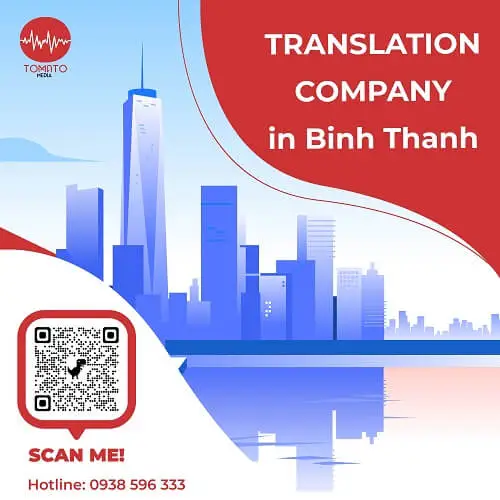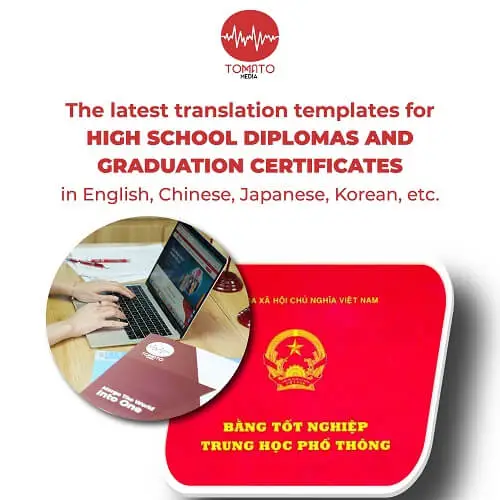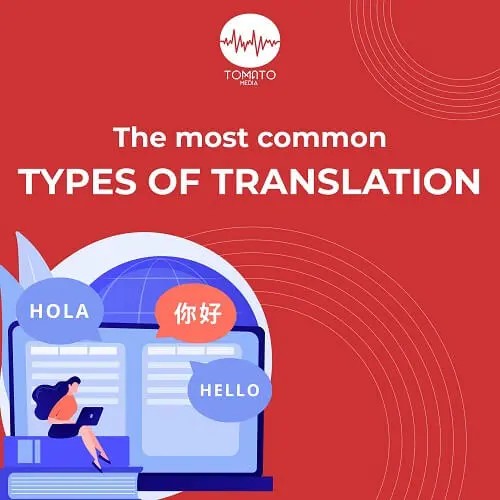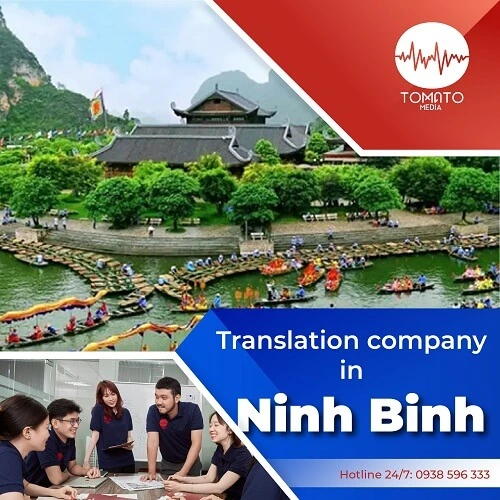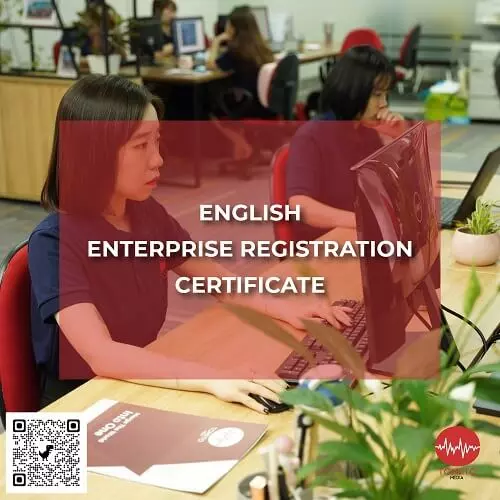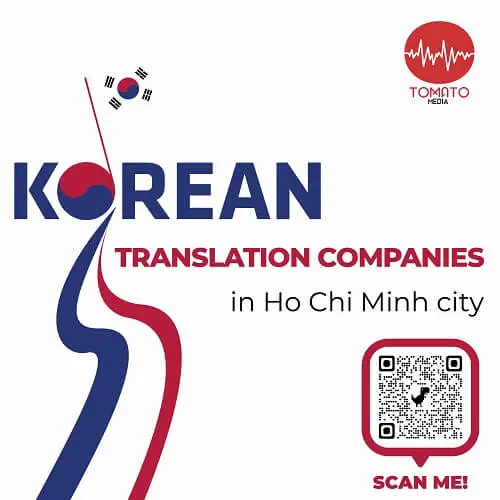The demand for certified translation services in Binh Thanh District is also increasing. If you are looking for a prestigious translation company in Binh Thanh, let’s refer to the article below. List of prestigious Binh Thanh’s notarized translation companies No. Binh Thanh notarized translation companies Address 1 Binh Thanh notarized translation company – Tomato Media [...]
Does the notarized translation need the original?
Whether or not a notarized translation needs the original is a common concern of many customers when looking for translation services. If you also have the same questions, this article will help you find the answer.
NỘI DUNG (CONTENT)
Understand the notarized translation service
The notarized translation service is the translation of documents, records, and materials into a target language at the customer’s request. When the translation is finished, the staff will bring it to the Department of Justice, notary offices, or private offices to certify that it is accurate in comparison to the original document.
According to the National Assembly of Vietnam’s Notaries Law 2014, there are four types of notaries:
Notarization of the translation
This is an notarial activity of confirming the accuracy and legality of documents carried out by individuals who are notaries.
Certified duplication
This work is carried out by organizations and competent agencies to certify that the information on the copy is identical to the original.
The main types of documents required in the notarized translation file include:
-
A translation
-
Notary’s commitment
-
A copy (the original)
Does the notarized translation need the original?
In short, notarized translations may not require the original, but a scan or image of the original document is required. That is, you do not need to bring the original for translation and notarization. However, you should also prepare the original document along with the translation to avoid cases where the notary office needs to check and verify the document.
Special cases:
- For translations of documents into Chinese that need notarization, it is MANDATORY to have the original. Visa and passport translations for purposes such as studying abroad, labor export, travel, and employment are typically NOT REQUIRED NOTARIZATION.
- Documents that lack a company signature, a seal, or an authentication mark are not qualified to be notarized (since it is impossible to determine whether the document is original or not).
- If the (private or public) notary office suspects that a document is a forgery, it will request delivery of the original for comparison.
Important note when performing the notarized translation without the original
- In exceptional cases, the notary authority requires the attachment of the original for review. The original is submitted to avoid forgery or modification of the original content and to assure its validity.
- Even if not all units require the original, prior preparation will facilitate the notarized translation process.
- A certified copy can be used to confirm that the copy in the dossier is true compared to the original.
- In cases where the documents to be notarized do not require a particularly high level of legal status, a certified copy may be substituted for the original when submitting translated documents to a notary office. For instance, submitting documents to the school, personnel documents to the organization, etc.
Is the notarization of translations in private offices legally valid?
In fact, there are three forms of translation certification:
- Translation certification of translation company (with translation function)
- Translation certification of the Department of Justice of the district-level people’s committee (public notary offices)
- Translation certification of the notary – under the private notary office
These three types of certification have distinct legal weights. Depending on the need to submit documents, you must select the appropriate form based on the agencies’ requirements.
In summary, the answer to the question of whether or not a notarized translation needs the original is only for reference. You should refer to the state regulations on notary law for the best preparation.
Where can I get the notarized translation without the original?
There are currently notarized translation agencies that do not require original documents in order to provide convenience to customers who require document translation and notarization.
Tomato Media Translation Company has years of experience in conducting notarized translation procedures for various types of records, papers, and documents without the original. Tomato’s notarized translation package service promises to bring the highest satisfaction in quality, translation speed, and optimal cost.
You can choose:
-
Send a hard copy of the document to be translated to Tomato’s office address
-
Send a scan to mail info@tomatomediavn.com or Tomato Media Zalo at 0938 596 333
Tomato Media will conduct the translation, and if your documents are in the category of documents that requires the original to apply for a notary seal, our specialist will submit the file for a notary seal after receiving the original.
Contact the prestigious notarized translation office
Do you need assistance with translating and notarizing documents? We are here for you!
The notarized translation process without the original
The process of notarized translation at Tomato is streamlined and ensures the translation quality. We will proceed with the translation based on the following steps:
| ❶ | Tomato receives project information and receives requests from customers |
| ❷ | Tomato hands over documents to the translator in charge of conducting research and preparing for the translation. |
| ❸ | The translator starts the translation phase. |
| ❹ | Conduct the proofreading (Editing – Proofreading) |
| ❺ | Proceed to format the document according to the original or at the customer’s request |
| ❻ | Proceed to apply for a notary seal (upon receipt of the original) |
| ❼ | Carry out the final check before handing the notarized copy over to the customer. |
FAQ about the notarized translation service
The following are questions related to notarized translations that we have compiled:
In what cases can a notarized translation be performed without the original?
In the process of notarized translation, some clients may experience problems with the original as follows:
-
The original is damaged, lost or is in the process of re-application
-
The original is on its way to the translation company
-
The issuance of the original is pending and will be available in the near future
If you encounter one of these situations, the process of notarized translation is delayed, and it affects the completion of the necessary documents.
In addition, as stated previously, you can translate and notarize documents using a scan (or photo file) of the original document.
Is it possible to conduct a notarized translation on your own?
The 2014 law on notaries stipulated that:
❝ The translation of documents for notarization must be carried out by translators who are collaborators with notarial organizations.
Therefore, if you meet the qualifications for language proficiency as well as the procedure for certifying the translator’s signature, you can self-translate documents and carry a notary seal application. Otherwise, if you are unable to translate on your own, the notarized translation must be performed by a legally qualified expert. ❞
Therefore, if you meet the qualifications for the language proficiency as well as the procedure for certifying the translator’s signature, you can self-translate documents and carry a notary seal application. Otherwise, if you are unable to translate on your own, the notarized translation must be performed by a legally qualified expert.
Is it compulsory to translate and notarize all types of documents?
Not all types of documents need a notarized translation. Here are some types of documents that need a notary seal to be legally valid:
- Agreements of transfer, donation, lease, etc.
- Contract for transfer of land use rights
- Enterprise rental contracts
- Inheritance of land use rights
- Proof of construction work donations, purchases, or inheritances
- Wills
- Property agreements
- Written agreements of surrogacy
- Documents to be submitted to the embassy, study abroad applications, labor export documents
What are the criteria for choosing a credible notarized translation agency?
There are countless notarized translation units on the market today. However, to ensure accuracy in the content as well as the legal value of the translation, you need to consider the following factors when searching for units to collaborate with:
- Translators understand the language and the field to be translated
- Translators and managers have a professional working attitude and a high sense of responsibility.
- Commitment to quality and punctuality to hand over the translation
- The unit has the authority to process the notary seal application, and the translator’s information has been registered with the Justice Department.
- Commitment to the absolute confidentiality of customer information as well as records and documents in the project.
- Reasonable, clear and transparent translation costs from the consultation stage to the completion of the notarized translation of documents.
Can I request an instant notarized translation service?
Customers can get it on the same day in the event that the duplication or notarization is performed at a private notary office. Otherwise, if you want to apply for a notary seal from the Department of Justice, the completion time will be 3–4 working days.
The working time of the Department of Justice is from 7:00 AM to 5:00 PM, Mondays to Fridays (except holidays, Lunar New Year according to state regulations). Therefore, if you need instant translation services, send your documents to Tomato as soon as possible. Depending on the language to be translated, document content, and project size, Tomato will try to meet the requirements at its best, ensuring both the translation quality and its legal value.
How long do notarized translation services take?
Tomato Media will strictly adhere to the notarized translation duration as agreed upon with the client. With a translation speed of up to over 20,000 words per day, we can confidently complete the translation well.
The notarized translation duration includes the translation time and the time to get the notary seal. Depending on the need for judicial or private notarization, or certified duplication, the time to complete will be different.
For example:
➊ Customers who want to translate 2 copies of the COVID-19 vaccination certificate and need regular notarization can possibly get the result on the same day.
➋ Otherwise, customers who need to translate the applications for study in Japan and submit them to the embassy should obtain a notary seal from the Department of Justice. Therefore, the time of translation and notarization will be between 3–5 working days.
Can I translate documents without notarization at Tomato and how do I get documents if I’m far away?
It is possible to translate documents online if you do not need notarization. In addition to notarized translation services to help customers optimize time, Tomato accepts different types of documents that do not require notarization with guaranteed quality. If you are far away and it is not convenient to go to the office to receive the translation directly, we will support sending the translation in the following forms:
Soft file (online)
Small files will be sent directly by email. For large files (for example, videos), the product will be uploaded to an online storage site like Dropbox or Google Drive, and then the link will be shared via email for you to download.
Hard file
- For Word/PDF files, Tomato supports sending printed translations.
- For the video, we will use CD/DVD discs (usually the file will be sent online).
The hard copy will be signed and stamped as a confirmation by us. The translation will also be delivered via express service to the client’s address. This form may incur a printing fee and a delivery service fee.
Are there any special requirements for a notarized translation without the original?
If you only require a notarized translation, the original is not needed. However, documents that need notarization must ensure the following factors:
-
Foreign language documents must have a signature or seal of the agency abroad.
-
Documents in Vietnamese must be fully signed and sealed by the competent authority. When either of these factors is not guaranteed, the translator will not conduct a notarized translation.
-
Do not bring fake documents to translate because if found, they will be seized and transferred to the competent authorities in accordance with the law.
-
Provide a full system of abbreviations, names, spelling, specialized terms, etc., in the translation records as well as specific requirements for the translator (if any).
-
If you already have an old translation or reference translation, you can send it to the translator to meet the best translation needs as well as ensure consistency with previously translated records.
What is the cost of notarized translation services?
The notarized translation service fee can be calculated according to the following formula:
The total cost = The translation fee + the notary fee
The translation fee will differ depending on the project specifics, see the translation fee details here. In particular, the notary fee is calculated according to the price list issued by the notary office and the Department of Justice. The following is the price list for your reference:
*** The quotation is for reference only
| SERVICE | UNIT PRICE (VND/NOTARIZED COPY) |
|
Notarization of translations (Private Notary Offices) |
65,000 – 80,000 |
|
Notarization of translations (Public Notary Offices) |
120,000 – 160,000 |
Which languages does Tomato offer notarized translation services for?
Tomato provides notarized translations for more than 50 languages, including:
| English | French | Arabic | |||
| Chinese | Taiwanese | Spanish | |||
| Japanese | German | Czech | |||
| Korean | Thai | Dutch | |||
|
Italian |
Russian |
Khmer |
|||
| Burmese |
Finnish |
➩ | … |
What types of documents does Tomato provide translation services for?
In accordance with the law, Tomato can translate and notarize all papers, records, and documents. Some of the documents for which we usually receive notarized translation requests from customers include:
- All types of contracts
- Personal documents: birth certificate, ID card, citizen identity card
- Land use rights certificates
- Inheritance documents
- Wills
- Diplomas and certificates
- Agreements: purchase, transfer, etc.
- Study abroad applications, overseas employment applications
- etc.
Can I utilize a notarized translation service remotely?
It is possible. You can send documents by email, Zalo, or Tomato, and we will conduct the translation. After that, please send the original to the address of Tomato’s office. Upon receiving the original, our experts will apply for a notary seal. Afterward, the original document and translation will be sent back by courier to you.
What types of documents can be obtained for notarized translation on the same day?
Simple documents with short contents, such as birth certificates, identity cards, citizen identity cards, driver’s licenses, diplomas, certificates, etc.
Here is a summary of information to answer the question of whether or not a notarized translation needs the original that Tomato Media wants to share with you.
With a team of skilled translators with years of experience in the notarized translation field, Tomato promises to meet all customer needs with the highest satisfaction.
Send us your documents and requirements, we will make it the best!
| Ready to get started? |
Have a large project? |
| GET A QUOTE | ✉ CONTACT US |




